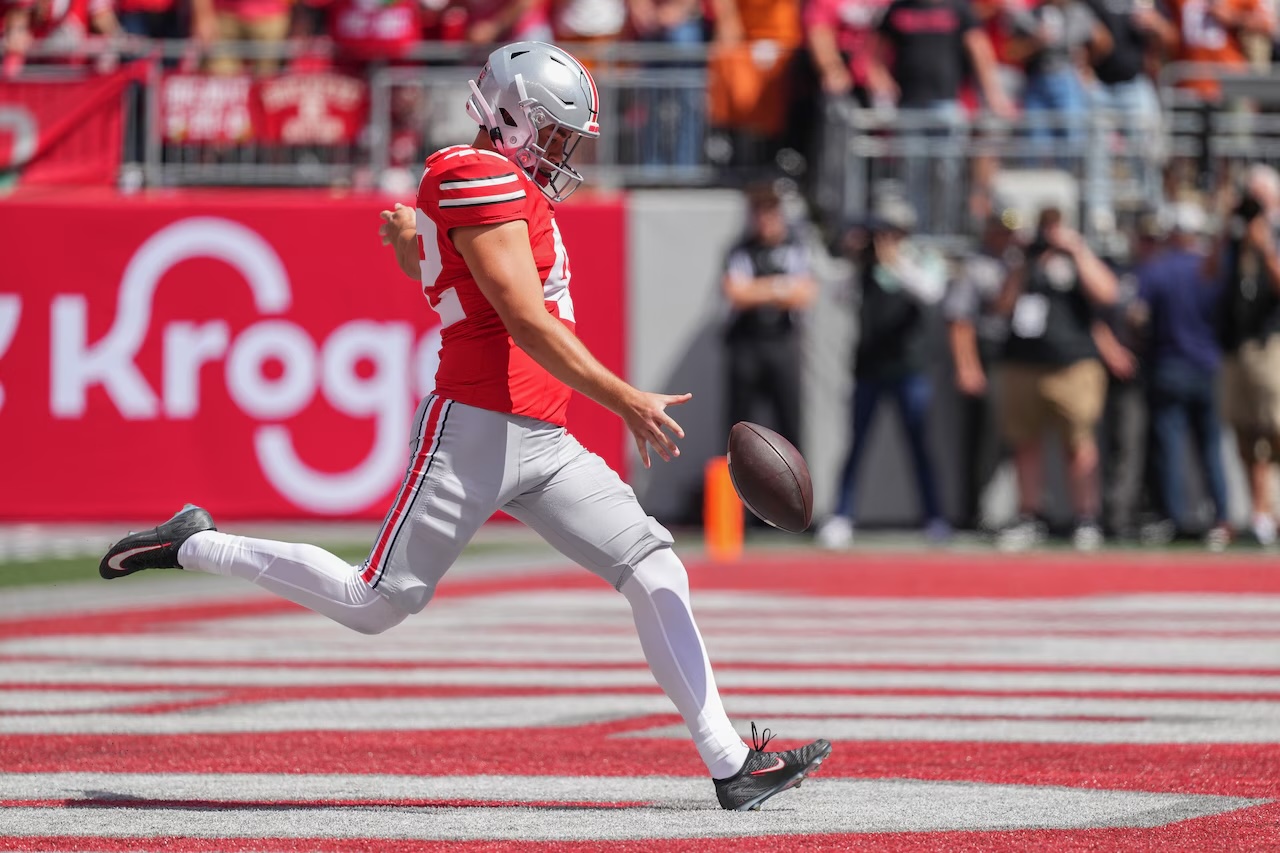Ryan Day isn’t one to sugarcoat things — and lately, the Ohio State head coach has had to face an uncomfortable truth. For all the Buckeyes’ dominance on offense and defense this season, their special teams — particularly punting and punt returns — have been an uncharacteristic weak spot.
During his most recent media sessions, Day addressed the issue head-on, admitting the team’s performance in the punting game hasn’t met expectations.
“We haven’t punted a whole bunch … the sample size is probably a mixed bag right now,” Day said, when asked about the possibility of shaking things up at punter.
He noted that Joe McGuire will remain the team’s primary punter for now, though backup Nick McLarty is still being evaluated. Day stressed that punting is a consistent point of emphasis in practice — not an afterthought.
“We work at it. It’ll be the first thing we do on Tuesday … I think we have the right guys in the game … but I know we can do better.”
The same scrutiny applies to the punt return unit. After Brandon Inniss mishandled a return earlier this season, Day called it a “fundamental football” mistake, not just a special teams miscue. In short, he sees this as a broader execution issue — one that can’t continue if Ohio State hopes to win big games down the stretch.
Despite calling the punt return unit a “red flag,” Day has resisted making sweeping changes. He remains confident in his current personnel, signaling that the staff believes the problems are fixable with sharper fundamentals rather than wholesale replacements.
Still, Day’s tone has shifted from cautious optimism to quiet concern. It’s clear he knows these flaws can’t linger forever — because in college football, the smallest mistake can decide the biggest games.
It’s easy to overlook special teams when your team is undefeated, your quarterback is rolling, and your defense looks championship-caliber. But that’s exactly how great teams get blindsided — by ignoring the quiet parts of the game until they become loud.
Ohio State’s punting and return units are a ticking time bomb. They haven’t exploded yet, but the signs are there.
1. Field Position Is Everything
A 40-yard punt that nets only 30 after a return isn’t just a bad stat — it’s lost field position. Every short field forces the defense to work harder and gives opponents easier scoring chances. Reports suggest McGuire’s average hasn’t topped 45 yards this season, and the directional consistency simply isn’t there.
When the Buckeyes face Michigan or a playoff opponent, every hidden yard will matter. The defense is elite, but it shouldn’t have to bail out a subpar punt every drive.
2. Turnovers on Returns Are Game Killers
The Inniss muff was more than just a bad bounce — it was a warning sign. Special teams miscues flip momentum faster than interceptions. Even without fumbles, Ohio State has struggled to create positive return yardage, often settling for fair catches or negative plays.
That lack of explosiveness means the Buckeyes’ offense consistently starts deep in its own territory, making life harder for the unit that should be setting the tone.
3. Big Games Magnify Small Mistakes
Against Indiana or Rutgers, you can survive a shanked punt. Against Michigan or Georgia? You can’t.
Special teams matter most when everything else is equal. One botched snap, one poor punt, one bad coverage angle — that’s the difference between a semifinal win and another heartbreak headline.
4. The Psychological Toll
Momentum swings are real. When a punt gets blocked or muffed, it drains the sideline. Players feel it. Coaches feel it. The crowd feels it. These aren’t just physical errors; they’re emotional gut punches that can change the energy of an entire game.
5. Day’s Loyalty Could Backfire
Ryan Day’s measured approach — trusting his players and avoiding overreaction — is admirable. But special teams don’t fix themselves. If Ohio State doesn’t get more aggressive with competition at punter and returner, the same mistakes could resurface at the worst possible time.




